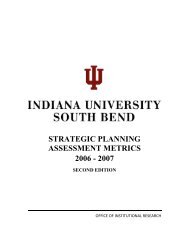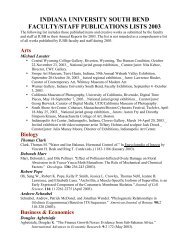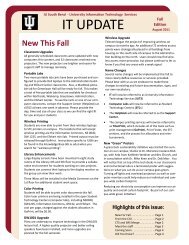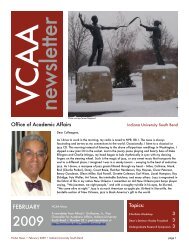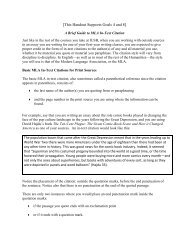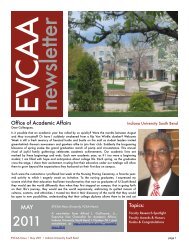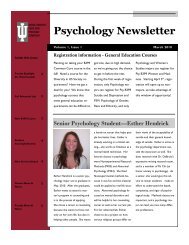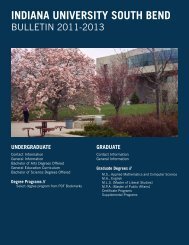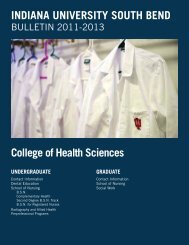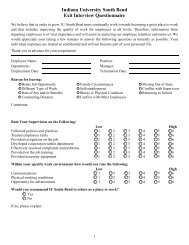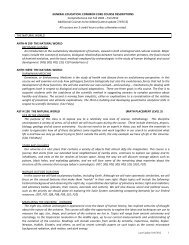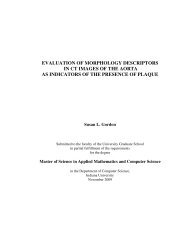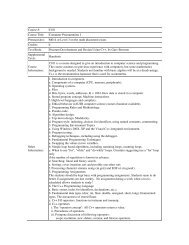Current version - Indiana University South Bend
Current version - Indiana University South Bend
Current version - Indiana University South Bend
Create successful ePaper yourself
Turn your PDF publications into a flip-book with our unique Google optimized e-Paper software.
BUSB-K 507<br />
BUSB-K 510<br />
BUSB-K 515<br />
BUSB-K 520<br />
BUSB-K 585<br />
enterprise resource planning (3 cr.)<br />
P: BUSB-A 501, BUSB-D 501, BUSB-D 502,<br />
BUSB-D 503, and BUSB-F 523. Provides<br />
an overview of the enterprise resource<br />
planning (ERP) field to students. Topics<br />
covered include principles of enterprise<br />
resource management, history of ERP,<br />
and differences between function-oriented<br />
enterprise management and processoriented<br />
management. It covers issues<br />
related to planning and implementation of<br />
ERP systems. An ERP software (SAP R/3)<br />
is used throughout the course to analyze<br />
various issues.<br />
decision support systemS (3 cr.)<br />
P: CSCI-A 510 and BUSB-F 523. The<br />
course provides in-depth knowledge and<br />
training in adapting a variety of tools and<br />
techniques to develop decision support<br />
systems in support of complex decision<br />
problems.<br />
electronic commerce (3 cr.)<br />
P: CSCI-A 510 and BUSB-K 506. The<br />
course provides the technical, legal, and<br />
business concepts and skills required to<br />
manage a firm’s activities related to doing<br />
business via computer networks. Primary<br />
emphasis is on assuring that students<br />
understand the full spectrum of issues<br />
related to e-commerce.<br />
BUSINESS process reengineering<br />
through information technology (3 cr.)<br />
P: BUSB-K 505 and BUSB-K 510. The<br />
course demonstrates, directly and by case<br />
studies, the relationships between business<br />
process and information systems, human<br />
resources, and organizational capabilities<br />
that support the performance of processes.<br />
seminar in management of<br />
INFORMATION technologies I (3 cr.)<br />
P: BUSB-K 510 and BUSB-K 520. This<br />
advanced seminar addresses important<br />
current topics on a variable basis. Possible<br />
topics include: artificial intelligence and<br />
intelligent agents, data warehouse and<br />
mining, groupware, human-computer<br />
interaction, information systems<br />
effectiveness, interorganizational systems,<br />
knowledge management, managerial<br />
and organizational cognition, strategic<br />
information systems, virtual organizations<br />
and emergent communities, design<br />
of distributed systems, enterprise<br />
architecture, global information<br />
technology, neural networks, simulation,<br />
and software engineering.<br />
IU SOUTH BEND COURSE DESCRIPTIONS 4289<br />
BUSB-M 594<br />
BUSB-X 591<br />
BUSB-X 592<br />
CHEM: Chemistry<br />
CHEM-C 101<br />
CHEM-C 102<br />
GLOBAL MARKETING MANAGEMENT (3 CR.)<br />
This course focuses on the realities of<br />
global market competition, successful<br />
penetration of non-domestic markets,<br />
and completive effectiveness in home<br />
markets. Coverage includes the global<br />
market environment; global marketing<br />
strategy concepts; penetration strategies<br />
for non-domestic markets; multinational<br />
marketing strategy problems; regional<br />
market analysis.<br />
GRADUATE INTERNSHIP IN BUSINESS AND<br />
ECONOMICS (2-6 CR.)<br />
This course engages student to learn in an area<br />
of the organization that permits the student<br />
to apply the concepts, applications and skills<br />
that they have learned in the classroom.<br />
Each intern is mentored by a faculty from the<br />
School of Business and Economics.<br />
GRADUATE FIELD PROJECT IN BUSINESS<br />
AND ECONOMICS (3 CR.)<br />
This course engages student in conducting<br />
field projects in local businesses. Teams<br />
of up to three students work with host<br />
firms to identify real business problems<br />
related to their fields of study in business<br />
and economics. The team of students<br />
work with a faculty advisor to formulate<br />
and implement solutions to real-world<br />
business problems.<br />
ELEMENTARY CHEMISTRY 1 (3-5 cr.)<br />
P: MATH-M 107 or Level 4 on the<br />
mathematics placement examination.<br />
Essential principles of chemistry,<br />
including inorganic chemistry. Generally<br />
taken concurrently with CHEM-C 121.<br />
Lecture and discussion. When followed<br />
by CHEM-C 102, satisfies programs that<br />
require only two semesters of chemistry.<br />
Credit given for only one of the courses<br />
CHEM-C 101, CHEM-C 105. CHEM-C<br />
101 may be taken without credit in<br />
preparation for CHEM-C 105. I, II, S<br />
ELEMENTARY CHEMISTRY 2 (3-5 cr.)<br />
P: CHEM-C 101 and CHEM-C 121 or one<br />
year of high school chemistry with a grade<br />
of C or higher. Introduction to organic and<br />
biochemistry, organic compounds and<br />
their reactions. Lecture and discussion.<br />
CHEM-C 102 may not be substituted for<br />
CHEM-C 106 or CHEM-C 341. Credit<br />
given for only one of the courses CHEM-C<br />
102, CHEM-C 106. I, II, S



